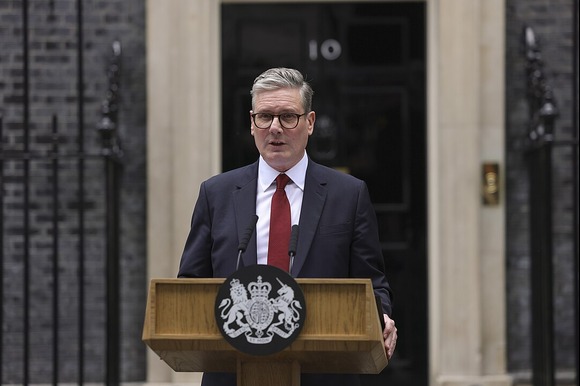Prime Minister Sir Keir Starmer has called for restraint following Israeli airstrikes that reportedly targeted Iran’s nuclear infrastructure, as tensions mount across the region.
Fears of a broader conflict intensified after Iran’s Supreme Leader Ayatollah Ali Khamenei vowed “severe punishment” in response to the strikes, which have also prompted reports of Iranian drone launches.
A high-level Cobra meeting is set to convene this afternoon to determine the UK’s response to the escalating crisis.
Foreign Secretary David Lammy has cancelled a scheduled visit to Washington DC where he was due to meet US Secretary of State Marco Rubio. Despite the seriousness of the developments, there are currently no plans for a ministerial statement in the House of Commons.
Government officials have clarified that the UK played no role in the overnight military operation but is closely monitoring the situation as it evolves.
“The reports of these strikes are deeply concerning, and we urge all sides to immediately de-escalate and step back from the brink,” Prime Minister Starmer stated. “No party benefits from further escalation. Stability in the Middle East must be the international community’s focus, and we are engaging with global partners to seek de-escalation. Now is the moment for diplomacy, calm, and restraint.”
A Downing Street spokesperson emphasized the UK’s commitment to diplomatic measures aimed at halting Iran’s nuclear ambitions.
Responding to questions about the UK’s involvement in nuclear negotiations with the US and Iran, the spokesperson said: “Iran’s nuclear programme has advanced dangerously and represents a significant threat to global peace and security. We have urged Iran to respond to President Trump’s offer of a negotiated solution, and we continue to collaborate with international partners on this matter. We are fully committed to a diplomatic resolution, including the use of the UN snapback mechanism if necessary.”
The UN’s snapback provision, part of the 2015 nuclear agreement, would automatically reinstate international sanctions on Iran if it is found to be in violation of the deal’s terms.
Conservative Party leader Kemi Badenoch stopped short of condemning the Israeli airstrikes, instead accusing Iran of being a hostile actor that had plotted terrorist activities on British soil.
“Iran is an adversary of the United Kingdom,” she said. “If Israel is acting to prevent Iran from acquiring nuclear weapons, that is not something that warrants condemnation.”
Badenoch further argued that the UK should prioritize increasing its defence budget and strengthening domestic energy resilience in light of the growing global uncertainty.
On social media platform X, Foreign Secretary Lammy reiterated the need for calm, writing: “Stability in the Middle East is crucial for international security. Escalation would be catastrophic for the region and serves no one’s interests. This is a perilous moment. All parties must act with caution.”
US Secretary of State Marco Rubio also stated on X that the United States had no involvement in the Israeli military operation, saying, “Our priority is safeguarding American personnel in the region.”
The attack marks one of the most intense strikes on Iranian soil since the Iran-Iraq War of the 1980s.
Israeli Prime Minister Benjamin Netanyahu declared that Israel had targeted key components of Iran’s nuclear enrichment and weaponisation programmes.
“We have struck at the core of Iran’s nuclear ambitions,” Netanyahu said. “This operation will proceed until the threat is fully neutralised.”
Iranian state media reported the deaths of top military commanders, including the head of the Revolutionary Guard, Hossein Salami, and General Mohammad Bagheri, chief of staff of the Iranian armed forces.
Liberal Democrat leader Sir Ed Davey called for the UK to play a stronger diplomatic role amid fears of a wider regional war.
“Millions across Britain and the world will be anxious about the potential for a full-scale conflict following last night’s Israeli military action,” Davey said. “The UK must provide international leadership and work with allies to address Iran’s nuclear programme through diplomacy, not warfare.”






